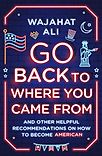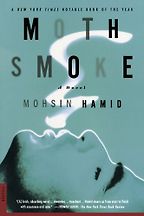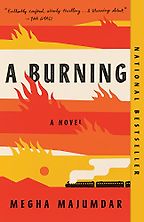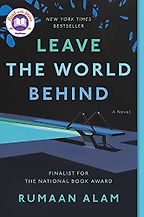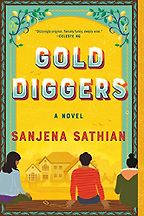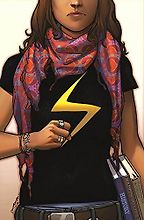You ask in Go Back to Where You Came From: And Other Helpful Recommendations on How to Become American, “Who will be allowed to hold the pen and write the rest of the American story?” Before we get to the five fantastic novels you’ve selected by South Asian Americans, please tell me about your memoir.
Go Back to Where You Came From is about loving a country that doesn’t love the rest of us back. It’s about being a citizen and a suspect. It’s a story about America told through a culturally specific lens. The story of an awkward, suburban husky-pants-wearing kid born to Pakistani Muslim immigrants who achieves elements of the American dream, but then, after 9/11, gets tagged as a bad guy and experiences elements of an American nightmare.
Go Back to Where You Came From is about those of us left out of the American story. If you read Hillbilly Elegy, now you can read our elegy. Too often, the rest of us are portrayed as villains or sidekicks—or if not, we’re erased. My book makes the case for why the rest of us should be considered co-protagonists in the American story. For this country to succeed as a multi-racial democracy, it is key that people pick up the pen to tell America’s full story.
1960s activists coined the term ‘Asian American’ to coalesce Americans of Asian descent around shared concerns and cultural nationalism. The term ‘South Asian American’ gained currency much more recently. How useful are these terms?
In the eighties and nineties, when we saw the Asian box on the census, we’d wonder what to do. Growing up, we thought of Asia as China, Japan, Korea, and Southeast Asian nations. So, a lot of us went for the “other” oval. In the past few years, there has been a concentrated effort to make sure Indians, Pakistanis, Bangladeshis, and others feel welcome in the Asian tent. That’s recent.
Moth Smoke, Mohsin Hamid’s marvelous first novel, is your first pick. Tell me about it.
Mohsin is better known for The Reluctant Fundamentalist and Exit West, but this book meant so much to me. During my freshman orientation, buying supplies at a UC Berkeley bookstore, I saw Moth Smoke on a shelf and thought: that’s a Pakistani name and there’s a brown guy on the cover. I couldn’t believe a novel by a Muslim guy set in Pakistan was put out by a mainstream publisher.
“Now there’s an explosion of South Asian American literature”
I love the way Mohsin places us at the point where Westernized dreams hit a wall. Oftentimes, in South Asian literature, like White Tiger, when people are trying to get out of their situation, then they get stuck or they get crushed. If you don’t have the power, if you don’t have the wealth, if you don’t have the access, it happens. Moth Smoke is about this guy who’s stuck. But the story has propulsive energy to it.
Like Moth Smoke, your next recommendation is, according to the New Yorker, “a brief, brave novel” set in South Asia. And like Mohsin Hamid, author Megha Majumdar moved to the United States to attend college and graduate school, then stayed to work in New York. Please tell me about Burning and what light it sheds on the Asian American experience.
Megha Majumdar, its brilliant author, moved to New York, where she’s an editor, from India. Burning is about social hierarchy and your place in it. Megha talks about the rise of fundamentalism, specifically Hindu nationalism, in India. She talks about the fear-mongering, corruption, and poverty in India that crushes dreams. Megha dissects the cruelty of the rise of fascism.
Burning is about a transgender character who gets portrayed as an extremist based on something she posts on Facebook. She becomes a scapegoat. There are parallels to America which make the book feel very relevant.
The New York Times called it “an exploration of precarity.”
Characters in both books we’ve talked about so far are in situations where everything is hanging by a thread. Precariousness is a common theme.
Does that observation apply to the next novel by a South Asian American author you’d like to recommend—Leave the World Behind, an enthralling thriller by Rumaan Alam?
It does continue this theme of precariousness. Leave the World Behind, is about two couples stuck together. A white couple with kids rent a vacation home. Something terrible happens in the world. The roads are closed, so the owners come home. They are stuck sheltering together. The plot makes it a great pandemic novel. It feels topical.
Though there are no South Asians in the book, the author is South Asian. Rumaan doesn’t lean into his identity. Here’s a Bangladeshi American inhabiting the lives of an elderly Black couple and a white couple. He is gay, but both these couples are heterosexual. I’m curious about the question: Do writers always have to write about their people? Can they inhabit other lives? When is it appropriation?
You’ve named American authors whose ancestry traces to Pakistan, India, and Bangladesh. Are there traces of the tensions that arose from Partition amid the South Asian American community?
You can see it. I grew up in multicultural California. I had Punjabi friends, Sikh friends, Hindu friends. But at Berkeley, when I was walking with a Hindu friend from home, another friend who was Hindu, told us that when he was growing up and brought a Muslim friend home, his grandmother said: ‘Why do you bring a warmonger to our house?’
Those tensions that you see in India, with the rise of Hindu nationalism, got exported to America. In my late twenties, divisions among South Asians became more pronounced. A lot of my Indian Hindu friends confessed that their parents hate Muslims or that their dads told them they could bring home anyone but a Pakistani. It was a simmering tension, then the rise of Hindu nationalism in India and violent Muslim extremism in Pakistan turned up the heat. Both India and Pakistan are nurturing extremism; that influences American-born desis.
Next, a first book that is deeply embedded in a South Asian American community. Please tell me about Gold Diggers by Sanjena Sathian
Gold Diggers is a novel about three overachieving, South Asian Americans trying their best to get the checklist of success and achieve the American dream. In this book, which blends a little bit with magical realism, a mother of the young girl character realizes if you take specific metal, melt it, and drink it, it helps you succeed, get a higher test score, get into the good schools, and get some money. But there’s a cost. It’s a Faustian bargain.
It’s a great story that speaks to the model minority myth. In the quest for success, what is the cost to our identity, our health, our relationships? Does the American dream bring happiness? This novel explores this in the realm of a magical realism.
It seems similar to Charles Yu’s Interior Chinatown, which won the 2020 National Book Award, and also reminiscent of Philip Roth. Sathian cites Roth, Saul Bellow and Cynthia Ozick, as writers who inspire her.
There are similarities. How do you fight back against a stereotype that casts you as a background character in the American story? Philip Roth’s work and Charles Yu’s too, is about rebelling against repression. These authors are asking: What’s the cost—to yourself and to your community—of achieving this thing called the American dream? Maybe all ethnic American writing touches on that theme.
This question calls for generalization: How would you say South Asian American literature is like and different from other ethnic American writing traditions?
Firstly, though often only people of color are seen as ethnic, everyone is ethnic. We all have some origin story. But writing that is seen as representative of side actors in America’s story gets burdened with expectations. Does it show all that is right and wrong with this community? Does it air dirty laundry? Expectations can make stories formulaic and boring.
Five Books interviews are expensive to produce. If you're enjoying this interview, please support us by donating a small amount.
Now there’s an explosion of South Asian American literature. More stories mean more representation. Freedom comes with that abundance. Some South Asian American writers are like: rather than writing an immigrant story, I’m just going to do a romcom. And Rumaan Alam decides: I’m not even going to write about South Asians. We’re getting to a point where South Asian writers can write whatever stories they want to write without feeling constrained by their identity. This wave of South Asian writers is escaping the straitjacket of representation.
In Go Back to Where You Came From you write: “At a young age, I looked around and realized America’s master narrative does not include a kid like me as one of its super-heroes. At best, I could only hope to be a sidekick.” So, it must have been exciting when Kamala Khan joined the Avenger universe. Please tell me about Ms. Marvel.
I have an expansive view of what counts as literature. Ms. Marvel is a comic, released as a graphic novel. It was created by G. Willow Wilson, a convert to Islam, and Sana Amanat, who is South Asian. Together they realistically depict a modern Pakistani American family.
It’s about Kamala Khan, a Pakistani Muslim American from New Jersey who has all the usual teen problems. She’s trying to fit in at high school, her family has certain expectations, she has a motley crew of friends, including one who wears hijab, and her brother is particularly religious. She’s a geek who gets superpowers overnight.
Growing up, I used to dream that Batman was brown. Now we have a brown Spiderman, Miles Morales. And we have Kamala Khan. There is something powerful about not just having a brown superhero, who’s part of the Avengers and beloved by the international community, but also the fact that Kamala is a good character trying her best. She’s flawed, she’s young, but she’s sincere and she feels real. My kids see Ms. Marvel on a shelf at a store, that’s thrilling. That’s the power of storytelling and representation.
You mention how much representation matters. You also seem to argue that varied representation matters.
There’s no such thing as the South Asian American experience. There are many South Asian communities and there are billions of South Asians. If you try to write for millions, you write for no one. Your writing won’t even please yourself. It’ll become like yogurt, yogurt that’s been left outside. No one wants curdled yogurt.
What can resonate is one story. My book is my story, it’s not everyone’s story, but it has entry points. I’ll give you an example. I talk about being a fat kid. Some readers say, hey I wore husky pants too. I talk about taking English as second language. Some readers tell me what they identify with in my story, and some tell me what they found novel in my story. We find the universal in the culturally specific.
Five Books aims to keep its book recommendations and interviews up to date. If you are the interviewee and would like to update your choice of books (or even just what you say about them) please email us at [email protected]

